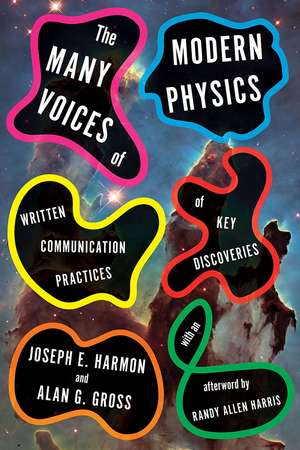The Many Voices of Modern Physics: Written Communication Practices of Key Discoveries
Autor Joseph E. Harmon, Alan G. Grossen Limba Engleză Hardback – 7 mar 2023
Preț: 491.28 lei
Nou
Puncte Express: 737
Preț estimativ în valută:
94.01€ • 98.40$ • 78.24£
94.01€ • 98.40$ • 78.24£
Carte disponibilă
Livrare economică 10-24 martie
Preluare comenzi: 021 569.72.76
Specificații
ISBN-13: 9780822947585
ISBN-10: 0822947587
Pagini: 336
Dimensiuni: 152 x 229 x 33 mm
Greutate: 0.5 kg
Editura: University of Pittsburgh Press
Colecția University of Pittsburgh Press
ISBN-10: 0822947587
Pagini: 336
Dimensiuni: 152 x 229 x 33 mm
Greutate: 0.5 kg
Editura: University of Pittsburgh Press
Colecția University of Pittsburgh Press
Recenzii
"By casting well-known texts in a communication context, the book offers analogies and explanations that can be used by anyone involved in public engagement."
—CERN Courier
"Those wishing to revisit the history of 20th-century physics may be charmed by the chorus of voices found in these pages."
—Public Understanding of Science
"The Many Voices of Modern Physics presents an eminently readable, enjoyable, and understandable tour of scientific communication through the years--which is no small task given the time frame the book covers."
—H-Net Reviews
“This exploration of communication in the physical sciences is much needed. Literary framing, engaging narratives, and careful analysis of communication artifacts come together to offer a tale that will pull the reader in and keep them along for the journey, even when—forget the complex equations—the very ideas seem so alien to the world we all apprehend. Indeed, the material is challenging, and the authors have masterfully handled the subject to provide non-physicists with a vantage to observe this fascinating rhetorical world. Their engaging and enjoyable book makes a highly important contribution to fields of communication studies.”
—Ashley Rose Mehlenbacher, University of Waterloo
“In The Many Voices of Modern Physics, Harmon and Gross expertly point out the different ways that thought experiments are used in physics research so that this text becomes an important contribution to our understanding of the complexity of how those experiments not only advance scientific understanding but also communicate complex ideas comprehensibly to non-specialist readers. The authors’ discussion of the use of metaphors, analogies, and visual representation is also very illuminating. Their book contains significant and thought-provoking insights about the ways that complex scientific ideas have been written about to teach and share them with various audiences beyond other subject specialists.” —Heather Graves, University of Alberta
—CERN Courier
"Those wishing to revisit the history of 20th-century physics may be charmed by the chorus of voices found in these pages."
—Public Understanding of Science
"The Many Voices of Modern Physics presents an eminently readable, enjoyable, and understandable tour of scientific communication through the years--which is no small task given the time frame the book covers."
—H-Net Reviews
“This exploration of communication in the physical sciences is much needed. Literary framing, engaging narratives, and careful analysis of communication artifacts come together to offer a tale that will pull the reader in and keep them along for the journey, even when—forget the complex equations—the very ideas seem so alien to the world we all apprehend. Indeed, the material is challenging, and the authors have masterfully handled the subject to provide non-physicists with a vantage to observe this fascinating rhetorical world. Their engaging and enjoyable book makes a highly important contribution to fields of communication studies.”
—Ashley Rose Mehlenbacher, University of Waterloo
“In The Many Voices of Modern Physics, Harmon and Gross expertly point out the different ways that thought experiments are used in physics research so that this text becomes an important contribution to our understanding of the complexity of how those experiments not only advance scientific understanding but also communicate complex ideas comprehensibly to non-specialist readers. The authors’ discussion of the use of metaphors, analogies, and visual representation is also very illuminating. Their book contains significant and thought-provoking insights about the ways that complex scientific ideas have been written about to teach and share them with various audiences beyond other subject specialists.” —Heather Graves, University of Alberta
Notă biografică
Joseph E. Harmon has been a science writer, editor, and manager for four decades in several divisions within Argonne National Laboratory. He is now working as a science communicator in support of Argonne’s Physical Sciences and Engineering Directorate. As an independent scholar, he has coauthored five other scholarly books with Alan G. Gross. Harmon and Gross won Best Book in Technical or Scientific Communication from the National Council of Teachers of English for The Scientific Literature: A Guided Tour.
Alan G. Gross was professor emeritus of rhetoric in the Department of Communication Studies at the University of Minnesota, where he was a founding faculty member of the Rhetoric and Scientific and Technical Communication graduate program. He also was a visiting fellow in the Center for Philosophy of Science at the University of Pittsburgh and held appointments at several international universities. He was a prolific author of dozens of articles and author, coauthor, or editor of more than a dozen books in rhetorical theory, rhetorical criticism, and the rhetoric of science. He was named a Distinguished Scholar by the National Communication Association in 2014.
Alan G. Gross was professor emeritus of rhetoric in the Department of Communication Studies at the University of Minnesota, where he was a founding faculty member of the Rhetoric and Scientific and Technical Communication graduate program. He also was a visiting fellow in the Center for Philosophy of Science at the University of Pittsburgh and held appointments at several international universities. He was a prolific author of dozens of articles and author, coauthor, or editor of more than a dozen books in rhetorical theory, rhetorical criticism, and the rhetoric of science. He was named a Distinguished Scholar by the National Communication Association in 2014.
